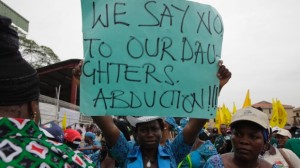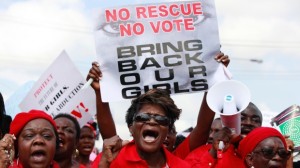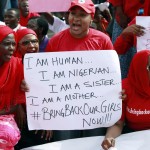On April 15th about 300 girls were kidnapped from a Government Girls Secondary School in Nigeria by gunmen dressed as Nigerian army-men. ABC News reports that some of the girls were taken to Chad and Cameroon for the purposes of forced marriage. The news of the kidnapped Nigerian girls made it slowly to Facebook and Twitter, but it is only weeks later that the case has featured heavily in international news outlets and blog posts.
It is a dramatic story, and if the dateline was elsewhere, it might have led the headlines much earlier. While Al-Jazeera has suggested that not having reporters on the ground makes it difficult to report, I venture to argue that the kidnapping of girls of colour in the developing world may not be at the top of reporting priorities. Would the media have picked up the story right away if 300 Caucasian girls in the UK, let’s say, were kidnapped?
Last week, a few media outlets prominently covered the issue as the leader of the Nigerian Islamist group Boko Haram was quoted as saying, “I abducted your girls. I will sell them in the market, by Allah.” Following international criticism about the government’s response, Doyin Okupe, the President’s spokesperson in Nigeria, assured CNN that the government has the capacity and political will to find the girls. Whereas a few days ago no one knew if any Western country would do anything to help the Nigerian government rescue the girls, the U.S. has announced the deployment of a team of military, law enforcement and hostage negotiators to help the Nigerian government. Meanwhile, girls continue to be kidnapped in the area.

The girls’ situation has also allowed opinion pieces to go viral. From articles that advocate the involvement of Western feminists in stopping child marriage to hashtags inviting bloggers and social media hipsters to join the pleas to rescue the girls, several writers shower their anger or proposed solutions. The NGO community has also joined the efforts. Amnesty International released a call to take action, while Al-Azhar University, the National Council of Canadian Muslims and the Muslim Public Affairs Council denounced the actions of Boko Haram.
A lot of the media coverage made me uneasy. First, whether this is performed by “Islamists,” “extremists” or “nationalists,” women and girls continue to be the primary victims of violence, enslavement and discrimination. Yet, coverage of this issue was less about the girls and more about anti-Western sentiments. Translating “Boko Haram” as “Western education is forbidden,” different media outlets describe the group as anti-Western and twisted. While that may be true, an article in Foreign Policy makes a good point of indicating that instances of violence against women often get overlooked. Lauren Wolfe, the author, says:
“Crimes against women and girls are not only commonplace, but they go ignored, unprosecuted, and unreported by the international media every single day, especially when they occur in the global South.”
On the one hand, people are talking about 300 missing Nigerian girls kidnapped by an Islamist-terrorist group in a developing country. Given the high rates of apathy in regards to the experiences of women of colour, particularly in the developing world, that this story is now a focus of media attention is important. On the other hand, I feel that there is something terribly wrong with our priorities and the consistency of our discourses.
For example: where is the outrage against the constant disappearance of Indigenous women in Canada, which has given birth to Sisters and Spirit and the Families of Sisters in Spirit? These organizations host vigils every year in memory of more than 1000 missing Indigenous women across Canada. Where is the international political will to seek justice for the Juarez Dead (Las Muertas de Juarez) in Mexico, amounting to hundreds?
Don’t get me wrong; this is not about whose tragedy is more important, but rather about the incentives that drive political action, social solidarity and media response. A post by Janell Hobson points out that the response in the case of the Nigerian girls was slow because not all girls are valued the same or seen as worthy of the same media attention, and the case would not have made it to the media if it wasn’t for the fierce protests driven by the girls’ mothers and families. Yet, she raises a critical question: now that the media is around and that people are listening, how do we help them make the connections beyond the situation in Nigeria? How do we make them see that there are thousands of missing and stolen daughters across the world – many of them in the very countries preparing to send technical help to Nigeria?
While Omid Safi released an emotional call for action denouncing Boko Haram and our unwillingness to address violence and injustice, I must say I feel discouraged by the situation and the path that the international community (media, governments and advocates) has taken. We aren’t thinking in terms of justice and we aren’t thinking long-term. The international outcry may be temporarily useful in getting some of the girls back, but is it enough to prevent the disappearance of other Nigerian girls in the future? Is the uproar enough to drive people to be concerned with the wellbeing of girls, particularly those of colour, in the long term? Similarly, the hashtags and celebrity posts show anger and outrage about the situation, but how do they address the fact that all communities, particularly those of women of colour, have missing daughters?
This story brings together two seemingly divergent issues. On the one hand, we have the mainstream media’s interest in the actions of Islamist Al Qaeda like groups, and on the other, we have “the racial disparities in mainstream media’s reporting of the missing.” Although it has been slow, the international attention to this story may (and hopefully will) be useful in the efforts to find and rescue the kidnapped and missing girls, and the hashtags and posts show justified anger and outrage about Boko Haram’s criminal actions. The question I ask myself, however, is how do we take this attention to this story and expand the discussion about less dramatic kidnappings and disappearances in other communities, particularly those of colour, which are often “missing” from the stories of the missing?















